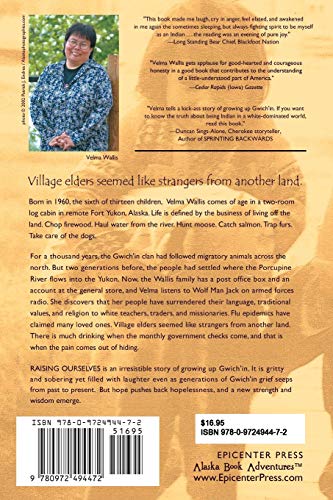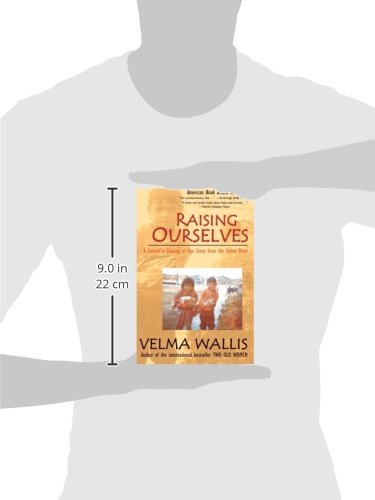



Raising Ourselves: A Gwich'in Coming of Age Story from the Yukon River
E**R
A Biography Full of Anguish and Important Lessons
I first read "Two Old Women" and loved it so much I shared it with others. When I learned the author, Velma Wallis, had written a biography, I wanted to read it as well. The connection between the two books is meaningful, as it told of Velma's escape to the forest and mastery of traditional skills and survival that opened the way for her to break free of the destructive patterns of dysfunction that engulfed her family and community. She could also bond, at last, with her often-drunk mother, who was able to pass down to her the legends and ways of the Gwich'in peoples.Growing up, Velma and her 14 siblings (two of her brothers died) were, indeed, forced to raise themselves, as their parents were overwhelmed and the resources were scant in their native village near Fort Yukon, Alaska. Wallis is sometimes brutally honest in her retelling, including her own shameful actions and attitudes. On the family tree, she fell between her 9 older brothers and sisters, and her 5 younger siblings. She is especially close to and supported by her sensitive but capable brother Barry.The story begins with her birth in 1960 and her earliest memories in the family's 2-room log cabin and hardscrabble existence. Because Velma is headstrong, she is sent to various relatives to be "tamed". Her Grandmother, Martha "Itchoo" and Aunt Nina give her affection and direction in her early years missing from her own parents.The telling of her story is simple, linear and straight-forward. Her alcoholic father dies and the food that he brought in by hunting no longer provides sustenance and, as their mother goes into a deep depression, she starts to disappear as her drinking increases. Then, literally, the children are left on their own, adrift in a world of despair. "The 1970s were a time when everyone in Fort Yukon seemed to be drinking. A whole generation of us spent years with no concept of rules, discipline or order. Nor did we feel safe at any time of day."After great struggle, with her children's support, their mother attains sobriety and works as a janitor until her much-abused body begins failing her. "Just as a war always has an aftermath, years of addiction are followed by an aftermath, too... Where she had been drunk and oblivious to the fact that we had grown up, we had been sober and oblivious to the fact that we needed to grow up. Children of alcoholics are stunted mentally, emotionally, and spiritually along with the addicted person. We thought Mom was the one with the problem. But after she sobered up, we had to begin the same process of gaining sobriety. We discovered that there was no more room for sickness or unhealthy thoughts."The scenes where she describes the Bully and the gangs that tormented her are painfully realistic and her experiences in their school are heart-wrenching:"My first experiences with schoolteachers were not much better. In first and second grade, my teachers were women who were disciplinarians and took it upon themselves to whip us anytime we so much looked at them the wrong way... Once, when my first-grade teacher paddled my behind with a Ping-Pong paddle, I laughed at the foolishness of it. She was a frail thing, in high heels and a skirt, who wore herself out spanking a bunch of us, and it was obvious she was getting tired. When at last she started in on me, I started to giggle. She became so incensed that she threw me into the closet for an hour.Already in the closet was a boy who stank from lack of washing. The other kids sniggered to think of me in the closet with the boy they called "Flower" after the skunk in Walt Disney's "Bambi". He did have a powerful smell, but more than that I remember peeking out of the cracks in the closet door and thinking that my teacher was a witch. My first-grade mind conjured up methods of exposing her to be beheaded for her evil ways.My second-grade teacher was a devil in disguise. She and I locked horns the minute we met... I managed to keep a low profile that year, but nonetheless, the teacher held me back for a couple of weeks the following fall. Somehow she felt I would benefit from being humiliated. The day she graduated me from the second grade to third in mid-semester, she made me push my desk all the way down the hallway to the third-grade classroom while my peers called me a dummy. The teacher did nothing to stop the jeers as I pushed my heavy desk. I was well-acquainted with feelings of rebellion and hatred toward educators when I met my third-grade teacher. She would be the one to open doors in my mind and to restore some of my self-esteem.Miss McMullin was a black woman. She wore musky perfume, pearly necklaces, and colorful muslin, satin and embroidered outfits with coordinated shoes to match. In contrast to our mothers... Miss McMullin seemed filled with patience, love and humor. We gravitated to her. Her accepting nature made us better people. She healed my otherwise tattered soul."Throughout this biography, the balance seems a lot like this: 2/3 negative experience and hardship, but then comes 1/3 positive and VICTORY! Velma's spirit is tested again and again, but she is much more than a survivor- She's a winner, in the end, able to lift herself out of the muck and pioneer a path for others as well. By publishing her "Two Old Women" book , a prize-winner translated into 17 languages, she `restored some of the value and dignity of her traditional culture. Through her broader exposure to the world, she becomes clear-eyed about the challenge of healing her people and helping them transition to a healthier, brighter tomorrow.
W**N
Really good book.
Got this as a present for my sister in-law who comes from Fort Yukon, Ak. She loves it. Reminds her of growing up there, and showed a different side to people/events she experienced. Packaging was good and it came in quickly. Thanks 🐼🐼
A**L
A Caring and Realistic Portrait of a Rural Alaskan Village
This is a fine follow-up to Alaskan Indian Velma Wallis's best selling book "Two Old Women," which is based on a story her mother told her, just before she would go to sleep in their two-room cabin in Fort Yukon in the Alaskan north country.It was a cabin she shared with her parents and 12 brothers and sisters, and in this book, she helps us to see every nook and corner of that cabin, including all kinds of interesting items under the beds, and that Alaskan staple, the chilly Outhouse.She describes the struggles her parents make just to keep the family fed and warm ---a real subsistence life-style. Then the changes in the 1970s, when television and a liquor store came in.Early in the book, she says that there were many times in her childhood when she was happy, but also a good number of times when she was unhappy because of the alcoholism affecting those around her.As a resident of rural, or "bush" Alaska, I feel that we could all use many more stories about village life in this last frontier, especially stories told by the Native people who live there.I share another reviewer's conclusion thanking Velma for her courage and insight. Also her appreciation of the tiny details in our daily lives, and finally, her sense of humor. No matter how difficult the winters or family circumstances can become, I've learned that a sense of humor always helps.I'm eagerly waiting for your next book Velma, and a movie as well.
H**Y
A New Perspective
This book is about Velma Wallace's life. She is only two years older than I am, so it has been a real mind bending and awakening read for me. She is very open about life growing up in Fort Yukon, Alaska with twelve brothers and sisters. She lets us see within the walls of her two room log cabin that sits downtown. We see the joys, the struggles, and the sorrows of growing up Indian in Alaska. Velma is not very many generation removed from when the Indians had to survive together off the land, before the influence of Western Culture. She artfully expresses the changes that happened, and how the old ways were still woven in with the new ways. I learned a lot about the culture, and the changes and challenges that affected these people. From the comments on the cover by other Native American Leaders, this story rings true for other Native cultures besides just the Gwitch'in. A very powerful book.
M**I
more Velma please
this book was a bittersweet look at Velma’s life, family history, and culture. Alcoholism and trauma colored her life experiences on a personal and macro level. She is so genuine. This book could be made into a miniseries. I want more of her stories.
T**A
Important reading especially in these times
Powerful writing, her words are insightful and moving.
R**D
Growing up in rural Alaska
I have been researching Alaska for a novel I'm writing, and I found this autobiography very interesting and informative. It was not an easy life, and Ms. Wallis has written very evocatively about brave and lively children growing up under difficult circumstances. It shows the strength of Gwich'in the women in coping with hardship and tragedy, as well as their ability to maintain a sense of humor throughout.
D**L
A family history and their adaptation to the advances in society in Alaska.
A very intense story of a family's history. The author told everything, she did not hide any of the family problems. It was very hard to put this book down once I started to read it. What it was like in Alaska before any real public services were available. The depth of drinking and diseases that came with the white man. And the other social problems that existed because of no government or social structure to help the people deal with these problems.
Trustpilot
3 weeks ago
1 month ago